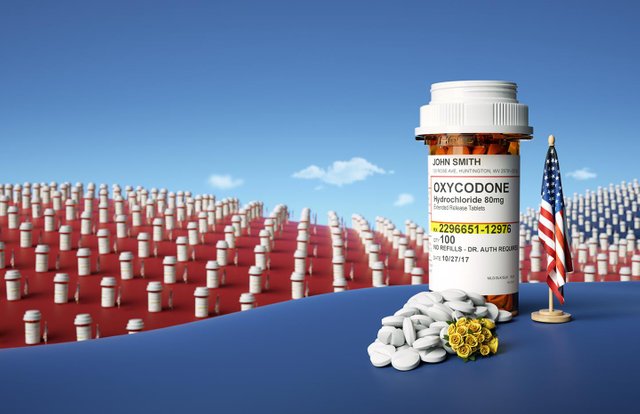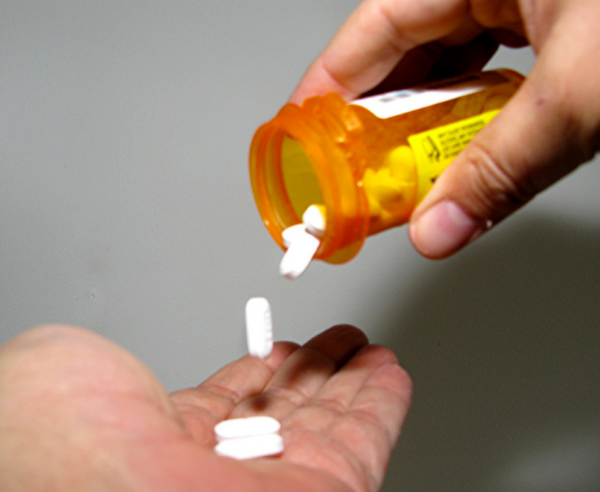More Than A Dozen Pharmaceutical Companies Being Sued Over Deceptive Marketing And Distribution Tactics

Huerfano County is a small county that's located in Southern Colorado, and it's the first jurisdiction in the state that's looking to sue at least 12 pharmaceutical companies.
There are at least 5 big pharmaceutical companies, including the likes of Johnson & Johnson and Purdue Pharma, that have already been sued over their alleged contribution to what many describe as an ongoing opioid crisis around the US.

Among these suits, are the repeated allegations of fraudulent marketing practices.
Claims have been made that these big pharma companies knowingly sold misleading and false statements regarding their products; which it's argued are what greatly contributed to perpetuating the problem.
Several companies, such as Purdue, have settled similar lawsuits already, relating to controversy over their marketing tactics.
They allege that there is little doubt that the distribution scheme and marketing practices of the pharma companies are at least somewhat responsible for perpetuating what many regard as a health crisis that has taken the lives of thousands.
If successful with their suit, they are looking for financial remedy to cover the costs where tax funds have been spent on emergency response, addiction treatment, and law enforcement over the matter.
About Those Marketing Tactics...

when did these pharma companies grasp the addictive nature of their products?
One well-known pharmaceutical company, Purdue, was previously sued several years ago and they ended up settling for hundreds of millions of dollars, with several of their executives pleading guilty to criminal charges.
It's alleged that the president of the company, who happened to be a chief medical officer, knowingly misled physicians as well as patients about the potential risks related to the products they were looking to peddle out.
In the interest of protecting profits, it's alleged that a great deal of information was withheld or not made public.

With their marketing tactics the companies are alleged to have downplayed the risks associated with their products, while eagerly overstating the benefits.
These companies are said to have aggressively lobbied doctors in an effort to influence their opinion and change their mind on the safety of opioid medication. They spent significant resources on lobbying so that they could have regulations and pain prescribing guidelines altered; to allegedly rig the AMA and FDA to work in their favor.
According to one previous investigation into Purdue Pharma by the Los Angeles Times, it was found that the company wrongfully marketed their OxyContin product as being able to relieve pain for at least 12 hrs. This is critical, because they allegedly had knowledge that the drug would not last that long, and since those taking it didn't see the 12 hrs of suggested comfort they ended-up suffering withdrawal and this contributed to fueling an addiction for them.
However, since then, the company has made the effort to put clearer warnings on its products, updated its policies, and made more of an effort to highlight the addictive nature of the drugs. They've cleaned-up their act now, promise.

Courts have previously suggested that the drug companies aren't the ones that should be to blame, they say this is because it's ultimately the individual who is deciding to put the medicine into their body--and this is true.
They have also insisted that for many overdoses that take place, many of the victims are allegedly taking the drugs not as they were prescribed, and so it's been difficult for courts to rest blame with the drug companies.
Unsurprisingly, Pharmaceutical companies are also quick to point the blame at doctors themselves, who after repeated selling efforts, caved to the pressure and took the initiative to suggest the pills to their patients; who is to blame then? The doctor? The drug maker? Both? Neither?
One thing is for sure,...
and that is that the government isn't the solution to the problem by any means. On the contrary, their actions in many ways have created and continue to fuel the issue.

VETERANS ARE 2X AS LIKELY AS NON-VETERANS TO DIE FROM ACCIDENTAL OVERDOSES RELATED TO HIGHLY ADDICTIVE PAINKILLERS
Another way that the government directly contributes to the opioid problem is with creating customers with their ever-failing war on drugs. Because of their unrealistic stance on alternative treatment options, patients are left with big pharmaceutical options. Rather than opting to try something natural like cannabis to help patients, doctors instead had to turn to legal options like OxyContin.
This is despite research which suggests that painkillers might only make the situation worse for many. And other reports suggest that a majority of patients would prefer to try cannabis in order to try and manage their pain, but the government won't allow that; despite it being a legitimate part of a discussion regarding a real solution to the opioid issue.

There are many ways that the government contributes to this problem. So let's discuss another.
Their direct intervention into the economy, establishes monopoly power for some and along with the ever-growing list of occupational licensing requirements etc, this can easily prevent those who can provide a better service from rising to the market to help those who need it.
The system that is in place today effectively protects and enriches doctors regardless of the service that they provide.
Their part in preventing alternative and possibly safer healthcare treatments, and in directly fueling an increase in demand for pain management, needs to be acknowledged and addressed.
Maybe if they made the move to address these two areas of concern, then we might eventually see some positive results in this area in the way of a decline in overdose deaths and rates of addiction.
Don't be surprised if the federal government never mentions any of these options though. They have insisted however, that they are going to better regulate the marketing of pharma companies as a solution to the problem.
Pics:
Foreal via newsweek
via Elevations Health
via itbusinessedge.com
via gerilen.files.wordpress.com
wikipedia
sftt.org
via haloparalegal.com
The content posted above is intended for informational purposes only.
Sources:
http://denver.cbslocal.com/2018/01/29/huerfano-sues-pharmaceutical-companies/
https://www.cdc.gov/nchs/data/databriefs/db294.pdf
http://abc27.com/2018/01/29/questions-surround-when-pharmaceutical-companies-knew-opioids-were-addictive/
http://www.mytwintiers.com/news/local-news/questions-surround-when-pharmaceutical-companies-knew-opioids-were-addictive/944491521
https://steemit.com/cannabis/@doitvoluntarily/big-pharma-funding-cannabis-opposition
https://www.cnn.com/2017/09/19/health/state-ag-investigation-opioids-subpoenas/index.html
https://www.theatlantic.com/business/archive/2017/06/lawsuit-pharmaceutical-companies-opioids/529020/
http://www.latimes.com/projects/oxycontin-part1/
https://www.reuters.com/article/us-usa-veterans-opioids/opioid-abuse-crisis-takes-heavy-toll-on-u-s-veterans-idUSKBN1DA1B2
http://www.newsweek.com/2017/10/20/va-fueled-opioid-crisis-killing-veterans-681552.html
https://mises.org/wire/big-pharma-makes-drugs-please-regulators-not-customers
https://fee.org/articles/there-is-no-proof-that-mandatory-rehab-helps-addicts/
The government will always say they are doing everything in their power to fix the problem and they are working on it and like you said "they are going to better regulate the marketing of pharma companies as a solution to the problem".
First of all they don't want to fix the problem because if they did they would be no war on drugs and we all would be able to buy legal natural plant-based medicine (other effective natural health options), but that means no big bucks in their pockets. The only way they can benefit from all of this is only give us the pharmaceutical options which are not working and as a matter of fact making a lot of damage.
I love to see blogs like this in this platform because the more we speak out about these issues the more people will awake and aware of what the governments and pharmaceutical industries are all about.
I think you could start with the patents. Patent royalties provide perverse incentives to market the drugs, to prescribe drugs for problems that the drugs were never approved for use on, and to simply acquire market share.
Take away the patents and then see how happy they are to bombard doctors with their message. Take away the patents and see how happy they are to pay for national prime time advertising. Take away the patents and suddenly people will see a need for drug research that is paid for upfront, or a manner of research that is modeled after the way research is done for neglected diseases.
I'd say a big part of the opioid crisis is the patents.
Nowhere are the terrible results of intellectual property more prevalent than in the pharmaceutical industry.
Very interesting read, thanks. I've read and heard about this issue in America so many times, but this post's many examples of how the US government is to blame is an eye opener. Usually big pharma is the scapegoat with the only blame on the government being that they are in big pharma's deep pockets.
Good job pointing out the real culprit in the opioid crisis. It's so sad that the state continues to prevent sick people from utilizing safe alternatives to the poison pushed by pharmaceutical companies. :(
Sad truth! Pharma has always been well protected by the government. Like you mentioned there are probably far more effective, non-addictive and safe therapies available to reduce pain nobody knows about. The world needs a reform and more transparency fast! That's for sure. Great read! It's articles like this that make people aware of the ongoing issues with opioids.
The pharmaceutical industry is so evil. I've always hated how they advertise on television alongside ads for McDonalds and other products. This influences people to act like consumers to ask specifically for drugs in ads to make big pharma. more money. Where I live we have a huge problem with opioid abuse. Our hospital had to open a special department because so many babies were born addicted to opioids. Local doctors are working on new policies to cut down on prescription opioids to try to work on a problem they helped create.
I hope these companies will get what they deserve someday, playing with people's health is not a game.
It is unfortunate to say it, but the truth is that the disease is a big business, it is known of many products that can be the cure however, they are not used in the sick, because of doing what the business is finished, there are even medical professionals that they can prevent the disease because they are facing a premature picture, however they let the disease advance to end up in a vicious criculo, as it could be the patients that require dialysis and all the negotiated that they have to their alrrededor.
Excelete post dear friend @doitvoluntarily, many thanks for sharing this information
I wish you a great day
Nice reasoning, the government is not the solution to the problem
Great piece. About time too, they astroturf so called peer reviewed articles and get away with making a killing